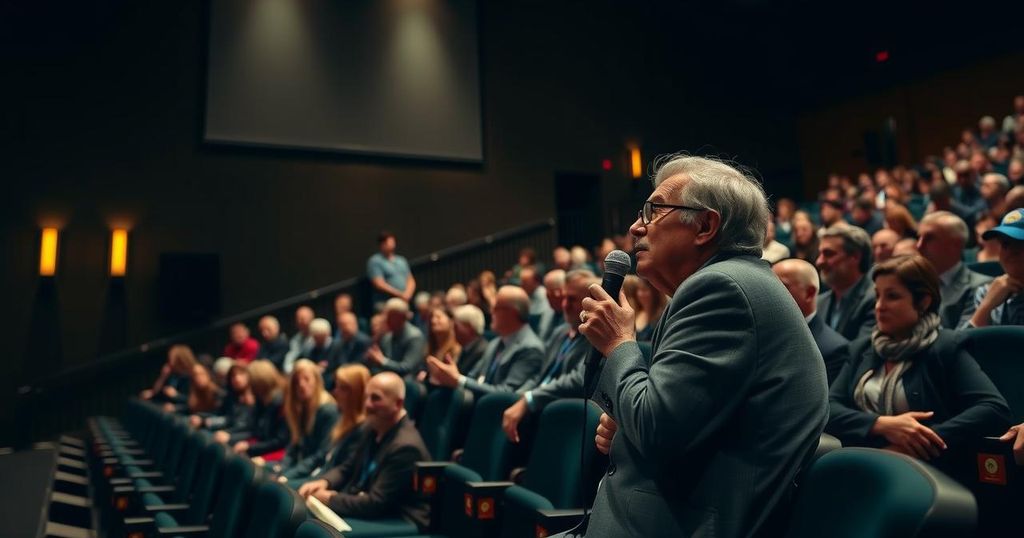On Thursday, the Human Rights Institute welcomed Aaron Mair, former president of the Sierra Club, for a discussion on intersectionality and the climate crisis. Mair emphasized the urgent need for equitable climate action, particularly for marginalized communities disproportionately affected by climate change. He called upon students to engage in activism and civic participation. The discussion was part of the institute’s ongoing efforts to address pressing environmental and human rights issues, highlighting the importance of an intersectional approach in understanding and combating the climate crisis.
On Thursday, the Human Rights Institute hosted a significant discourse featuring Aaron Mair, a distinguished alumnus and former president of the Sierra Club. This lecture, held in Casadesus Recital Hall, centered around the critical topic of intersectionality and its relation to the climate crisis. Mair emphasized the multifaceted nature of the climate emergency, echoing the recent advocacy from the United Nations COP 28, which calls for urgent action from nations to combat climate change. Mair pointed out the disproportionate effects of climate change on marginalized communities, advocating for an inclusive approach that addresses the specific vulnerabilities of various groups. This sentiment was reinforced by the event’s co-directors, David Cingranelli and Alexandra Moore, who underscored the necessity for compelling discussions on environmental challenges. Cingranelli articulated the enormity of climate threats, stating, “Climate change is one of the most significant threats to human dignity.” He further predicted an increase in activism, particularly among youth who bear the brunt of these challenges. Aaron Mair, a celebrated environmental advocate with over 40 years of experience, highlighted critical issues such as health disparities and the destruction of wilderness areas. As the first Black president of the Sierra Club and chair of the New York State Atlantic chapter, he has been a vanguard for environmental justice, championing the rights of underrepresented communities. During the lecture, Mair called attention to the stark disparities linked to climate change and the essential need for equitable action. He articulated that communities within the United States and nations in the Global South, especially those in nondemocratic systems, were profoundly affected by environmental crises. He highlighted the grave reality faced by wilderness protectors saying, “We’ve got hundreds of wilderness activists that have been killed, murdered, shot, not only in Africa, but also in Central America…not only for the sake of just protecting the environment, but for trying to protect our species and also the resource depletion by which all communities are dependent.” Mair connected these issues to historical injustices, using Hurricane Katrina as an example of how systemic discrimination exacerbated damage to marginalized populations, particularly Black and working-class residents in New Orleans. He cautioned against the ways in which natural disasters can create wealth for some while displacing others, stating that such disasters led to “wealth creation off of a crisis on the backs of communities of color.” He motivated students to become active participants in their communities, recognizing the crucial role they play in addressing these pressing environmental and human rights issues. Mair noted the importance of understanding climate change through both scientific and social justice lenses and articulated that communities of color have been at the forefront of this battle. He called for collective action and civic engagement, urging students to exercise their right to vote in November, not merely for national interests but for the greater good of humanity. With ongoing initiatives from the Human Rights Institute, the campus is poised to tackle environmental and human rights challenges continuously. A new course titled “Climate, Crime & Human Rights” will delve into pertinent subjects including eco-terrorism, the Flint water crisis, and Hurricane Katrina. Moore highlighted that the institute’s mission also encompasses supporting local efforts around food sustainability and justice, connecting these issues to broader environmental concerns. Overall, the lecture championed a holistic view of environmental justice, encouraging critical discourse and active engagement among students and the larger community.
The urgent discourse on climate change has gained momentum in recent years, particularly through international forums like the UN’s COP meetings. Intersectionality—a framework used to understand how different aspects of social and political identities overlap—has become increasingly vital in discussions concerning climate justice. Marginalized communities often bear the greatest burdens of climate change while being least responsible for its causes. This intersectional approach seeks to address these disparities by advocating for equitable solutions that consider the unique challenges faced by various demographic groups. Aaron Mair’s position as an environmental justice advocate exemplifies the intersection of these social issues with the urgent need for climate action. His insights reflect a broader call to action directed at youth and environmental activists to embrace these critical discussions and mobilize for meaningful change.
In summary, the lecture by Aaron Mair underscored the imperative of addressing the climate crisis through an intersectional lens that acknowledges the disproportionate impact on marginalized communities. His call for collective action and youth engagement resonates within the context of growing environmental activism. The Human Rights Institute’s commitment to fostering these discussions and programs signifies an essential step towards creating an equitable and sustainable future. As Mair urged, it is crucial for individuals to become involved in their communities and advocate for policies that champion human rights alongside efforts to combat climate change.
Original Source: www.bupipedream.com






